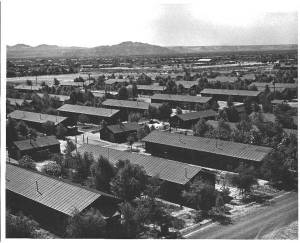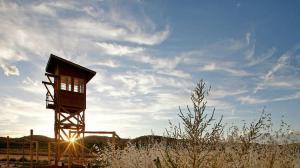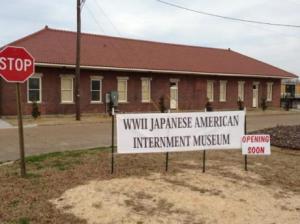19 February 1942 (1)
As the greater Southeast Asia Co-Prosperity grew in dramatically record time and the typhoon of conquest spread outward into the Pacific, an air of defeat floated over Washington and London. Out of fear, racism, political and commercial desires, President Franklin D. Roosevelt declared the infamous Executive Order 9066 on this date – 19 February 1942. The U.S. Secretary of War was given the power to remove any persons of suspicion away from the west coast and herded into camps that were immediately put into construction.
There are many efforts being made to preserve survivors’ stories. As the reader can see by the map, the amount of camps used to house the Japanese-Americans. Seattle has the Densho Organization which holds over 600 histories can be located HERE! The Japanese-American National Museum in the “Little Tokyo” area of Los Angeles, CA, now has over 300 memoirs and can be seen HERE. The Remembrance Project does collect photos and stories on a web site, but this usually costs about $90 to download on.
The Nebraska Studies Organization contains information on what transpired in that state during this period. They not only mention the camps, but they discuss the college situation at the time for the Nisei, their treatment in civilian life and the heroes who served. They can be located HERE!. [Once you enter the site, click on the box War Stories.]
Locally, I am privileged to live near the Morikami Museum. Although there were no camps here in Florida, George Morikami, immigrants and Nisei were carefully monitored and required to receive written permission from the District Attorney before traveling outside the area. The Yamato Colony here in So. Fla. will be featured more in depth in a post for a later date. They have a WordPress site that can be found HERE.
The Japanese- American internment is one of the most embarrassing blots in US history. It more or less followed in the footsteps of the Native American. Congressman Robert Matsui has an interview online about the file the government has on him, although he was an infant at the camps. He talks about his treatment after the war and how his parents refused to speak of it, even to him.
Rarely do you hear about Hawaii. Shortly after the harbor was attacked, authorities arrested several hundred local Japanese on O’ahu, Maui, Hawai’i Island and Kaua’i. Within hours, Buddhist priests, Japanese language school officials, newspaper editors, business and community leaders totaled over 2,000. They, just as the mainland, were arrested, detained and interned – no charges ever being filed. To locate the Pacific parks click HERE.
George Takei, author and actor, has written his autobiography in “To The Stars” which includes his memories of the camp, and took part in the dedication ceremonies at the Japanese-American WWII Museum in McGenee, Arkansas. Mr. Takei also participates with the Los Angeles museum.
Various sources I visited have listed the total number of Japanese and Japanese-American internees from 110,000 to 127,000 people.
#################################################################################################
PLEASE NOTE THE VIDEO BELOW IN THE COMMENTS, KINDLY SENT FROM NORMA, ABOUT THE SIMILAR SITUATION IN AUSTRALIA. ANN (GALLIVANTA) PUT IN A LINK FROM NEW ZEALAND FOR US, and most recently, Suchled contributed for us with this link___
#################################################################################################
HuMoR –
 #################################################################################################
#################################################################################################
Farewell Salutes –
Joseph Brodie – Taranaki, NZ; RNZ Army # 120580, WWII
Donald Cook – Boynton Bch., FL; US Navy, Vietnam (3 tours), Cuban Missile Crisis
Thomas Hoke – Springfield, MO; US Army Air Corps, WWII, PTO
Patrick Macnee – UK & CA; Royal Navy, WWII, ETO, Motor Torpedo Boats, navigator (actor)
Richard Meraz (aka Four Winds) – San Gabriel, CA; USMC
Lloyd Oczkewicz – Everett, WA; US Army, WWII, ETO, Silver Star, Bronze Star
Lawrence Stankiewicz – Wichita, KS; US Air Force, MSgt., Vietnam
George Urban – Lake Worth, FL; US Army, WWII
John Vascovitch, Sr. – Brockton, MA; USMC, WWII, PTO
#########################################################################################################
Posted on November 3, 2014, in WWII and tagged ancestry, family history, History, Military, Military History, veterans, WWII. Bookmark the permalink. 84 Comments.












Nice written appreciate you …
LikeLiked by 1 person
Thank you.
LikeLiked by 1 person
You always welcome here 😊
LikeLiked by 1 person
Thank you.
LikeLiked by 1 person
Over the years, I’ve had the privilege to know descendants of people who were interned. Some of the internees had family members who served with honor in the 442nd Regimental Combat Team. After the war, some of them emigrated to where I grew up in the southwest US and they organized a successful farming business. By the 50s and 60s there was still some degree of racial tension pertaining to WWII in the area, but for the most part, these Japanese Americans became beloved and respected members of the community.
LikeLiked by 2 people
The 442 was quite a unit, can’t say enough about them. My father Smitty served with the Nisei and he spoke more highly of them than some other G.I.s. I’ll get back to you about the other comment.
LikeLiked by 2 people
For GP Cox: I am writing up my Dad’s memoirs at http://www.jbmagersfamily.weebly.com. There are a couple of WWII related stories there along with some photos. I’m just getting started on the stories. A lady interviewed him for the WWII museum in New Orleans, so I have a time line and some basic facts, but I am going through it with him and asking my own questions and letting him answer in his own words as we tie in other events that the family would know.
LikeLiked by 1 person
It is going to take me some time to get through all of your website, but what I started with is fantastic! You know who else might be very interested, especially in the Alaska info, is Judy Hardy at Greatest Generation Lessons
LikeLiked by 2 people
Thanks, GP Cox. I will check out her blog.
LikeLiked by 1 person
Such hatred, fear, ignorance! Our history is filled with treating our people as enemies. Way back we marched the ‘Civilized Tribes’ on the ‘Trail of Tears’ and onto large internment camps called reservations is a good example.
Minnesota has a large German ancestry and during both WW’s many families ‘anglicized their family names because of ‘retribution’.The biggest dance hall in St. Paul changed it’s name from The German House to The American House.
Your humor cartoon about Congress not wanting to give the Army a raise reminds me of what President Eisenhower said when I was in the Army. He was against giving us a raise because he said any solder could get by on with a wage of just 5 dollars a month.The Army supplied all our basic needs.
LikeLiked by 1 person
Yes, Ike was well loved and practical – but man does not live by bread alone – as Mamie discovered with Ike and Kathleen Summersby – the Army doesn’t pay for any of THAT wine-ing and dining….. The G.I. needed more than necessities – then again – look who I’m telling!!!! 🙄
The Native-American situation – THAT can not be apologized for, we destroyed a continent of people and for those that did survive, we cheated and lied to – how can one apologize for that?
LikeLiked by 2 people
So much has been written about the internment of the Japanese in America during WWII. It still seems to me that the internment of German Americans during WWII is not discussed a log. Fortunately, my grandparents were not placed in a camp during WWII. However, my grandfather was deported from the US when America entered WWI against Germany.
LikeLiked by 1 person
I am always asking for stories the readers know about, so thank you for sharing that one, Barry. I did mention the Germans and Italians in the article that followed – you can see it HERE
War strikes fear into the hearts of everyone, which probably explains the deportation of you grandfather.
LikeLiked by 1 person
This is very sad. The same thing happened in the UK to people of Italian or German heritage. Some of the Germans interned were Jews who had escaped just before the war. On a happier note, a German Jewish family, friends of my parents, were fine and the boy went into the RAF.
LikeLiked by 1 person
I have been learning about the UK situation from Derrick and the Australian camps from Suchled, I appreciate you helping out as well!! Your story actually has a good ending with the boy in the RAF [hopefully he came home alright].
LikeLiked by 1 person
I live in Arcadia , CA , where the Santa Anita racetrack is located , and was , as you know , used as a “relocation center” until they were sent to Manzanar or other camps . An old neighbor of mine told me that everything else was blacked-out ( wartime ) but the racetrack was lit up . The Japanese-Americans were kept in horse stalls and quickly constructed shacks .Manzanar is a desolate place , too , by the way .
LikeLiked by 1 person
I thank you for sharing that information with everyone, Dan – as always a you are a welcome sight!! I actually forgot all about the racetrack!!
LikeLiked by 1 person
Such a sad state of affairs to treat other humans as they were treated by all sides during the war. Even sadder is the fact that most moves during wartime especially, have a base of someone or country wanting to promote their political power. I still think that holds true today in the battles we get involved in. Just my opinion, but I’m allowed an opinion, am I not?
LikeLiked by 1 person
You most certainly are entitled Bev. You’ve never had your comment deleted here, now have you? Just watch the news at night – everything runs on power – no matter WHAT the question – money and/or power is the answer!!
LikeLiked by 1 person
Nice repost, gpcox.
LikeLiked by 1 person
I actually tried to reblog your post Sands of Manzanar, but WP was giving me a hard time – I think because I had already reblogged it once before –
READERS – VIEW KOJI’S POST ABOUT THIS ACTION FROM A FIRST HAD POINT OF VIEW!!
LikeLiked by 2 people
May I ask what you thought of the Angel Island post?
LikeLiked by 1 person
Getting caught up! Your mixture of WWII information is superlative!
LikeLiked by 1 person
You’re too kind, Koji!! I don’t have the memory I used to have and that is very frustrating.
LikeLiked by 2 people
You mention the embarrassment to the US of these camps. How about that of the UK who invented the concentration camp in the Boer War? I’m afraid war brings out the worst in our rulers.
LikeLiked by 1 person
Power seems to bring out the worst in just about everyone, both in our past and present. What we need to do is find a way to moderate that power; we’d be spared an awful lot of embarrassing apologies!
LikeLiked by 1 person
Reblogged this on Janet’s thread.
LikeLiked by 1 person
Thank you, Janet. I appreciate the help!
LikeLiked by 1 person
Reblogged this on Pacific Paratrooper and commented:
Flashback to an older post of mine on this same subject….
LikeLike
From today’s point of view it was nothing to be proud about, but I am not hurrying to judge. You know how it is, humans are always smart after the fact.
LikeLiked by 1 person
Very true, Mia. It is very difficult to judge the situation now so long afterward. Thank you for stating your opinion.
LikeLiked by 2 people
True. It was the war going on. I am grateful they won the war, I cannot ask for more than that.
LikeLiked by 2 people
Late to your party once again, gpcox… As a bit of trivia, Iwao Takamoto was a prisoner in Manzanar along with my aunt’s family. He was the creator of Scooby-Do as well as Penelope Pitstop among others. Amazingly, he married two Caucasian women.
George Takei, in his interview in “Toyo’s Camera” produced by my friend Alan Miyatake’s family, said he had tremendous anger towards his father once they were put into camp. He angrily said to his father that he allowed his family to be herded like sheep into those camps. He regretted saying that to his father; unfortunately, Takei was never able to apologize to his father for what he said in anger to him before he died.
While it is but my opinion.. Sure, there was hysteria and some feared for the safety of the Japanese first generation folk as well as the Japanese-Americans born here. But I believe strongly that FDR and his administration made the decision to move them away from the coast primarily in fear of espionage. As the US military had broken the Japanese Purple code, they knew some espionage WAS occurring. However, to selectively arrest those Japanese or Japanese-Americans engaged in espionage would likely tip off Tokyo that the US had broken their secret code. As such, all Japanese and Japanese-Americans were forcibly moved away from the Pacific Coast en masse to keep their code-breaking under wraps.
LikeLike
Thank you so much for the added information, Koji! I knew you would have some for me! But I’m afraid there at the end, FDR wasn’t only interested in US safety – his friends in California (especially) land-owners, produce corporations, etc – it was mainly financial and racial in your state. Thanks so much for commenting!
LikeLike
It is always easy to criticize and blame from a position of hindsight. One needs to consider that we had been devastatingly attacked and we were in all-out war. There was a very real possibility that the enemy had planted saboteurs inside our borders and that there were dangerous sympathizers among the alien residents. There wasn’t time to screen each and every one of them. While it is true that they could have been treated with more respect, those in charge were very much aware of the possibilities I just mentioned and were reacting accordingly. I don’t know if there were any Americans detained in Japan but, if there were, how were they treated? Perhaps, if we could have hindsight beforehand, we would never make mistakes but I doubt it.
LikeLike
Thank you for the other side of the coin, Jim. Yes it is easy to look back with 21st Century, politically-correct eyes and judge their actions – the exact reason why I try to write only facts and allow the readers so much lee-way in their comments (don’t know if you usually read them, but some people get pretty testy). I like to see everyone getting into the discussion and not just agreeing . Thank you for commenting.
LikeLike
As always, GP, I get as much from the comments from your readers as from your articles. Great discussion.
LikeLike
Isn’t that the truth, Jacqui!! I keep pushing for them to help make this site partly their own; them and their added data will be here now forever!
LikeLike
Well you were certainly right GP, I have read all the comments and it did make it more interesting. Great input from everyone!! Thanks for letting me know and I look forward to your next post 🙂
LikeLiked by 1 person
Be seeing you then!
LikeLike
Great informative post gp, not sure what to make of the decisions made at that time, was it naive hysteria gripping the country, or an overriding ideology and perception of all Japanese.
Australia was no better, we incarcerated Germans and Italians, in fact one of our most noted escapes occurred in Cowra here in Australia with an outbreak of Italians.
Was it all mass hysteria or just a political war move.
Unfortunately, with my far seeing eye, and circumstances that are happening around the world, it is not unfeasable to see this scenario being played out again,with a certain race of people who follow an ideology that is veiled as religion.
Regards
Ian
LikeLike
All true, Ian, Plus – FDR, having been raised rich and in privileged schools was taught to think Aryan, as were his friends.(and your hierarchy) Japanese immigrants were farming, making money, running stores and production lines, etc. – they needed a way to get rid of them – the war was just a handy excuse. I am not excluding fear, without the panic of the public, it would never have come about. And yes, it came close to happening here again after 9-11.
Norma added information links in her comment for me to learn about Australia.
LikeLiked by 1 person
Shame ,Shame, Shame. Good writing and exposure.
LikeLike
Thanks, Mike. Did you happen to read the links that Norma sent on Australia?
LikeLike
Yes, the Cowra Camp is a well-publicized blot on the national landscape here. In all matters military, then and now, when America nods Australia winks and away they go like blind horses!
LikeLike
I remember when I was in Roswell, New Mexico that they had posted signs telling about a prisoner of war camp there. The prisoners lined the banks of their river with stones, which are still in place today. I believe it was a German prisoner of war camp as later Germany donated a piece of the Berlin Wall to Roswell.
LikeLike
I had not heard that story before, Bev. After looking on my map, I suppose Fort Stanton was the closest camp to Roswell.
LikeLike
Unfortunately, the type of fear that produced these camps doesn’t ever seem to go away completely. Apparently we had 29 Japanese nationals interned on Somes Island with other enemy aliens. There were Japanese POWs at Featherston, and there was a notorious incident here in 1943, which resulted in many deaths. This article, though long, http://environmentalhistory-au-nz.org/2012/12/the-peace-gardens-featherston-south-wairarapa-and-the-chor-farmer/ shows some wonderful connections which have come about for Japan, Australia and NZ because of our POW histories.
LikeLike
It was a long article, but well worth reading, Ann – thank you so much for putting in the link. Some of the readers have been checking into the links from Norma – I hope they visit here as well!!
LikeLike
Yes, it was Norma’s link that jogged my memory about the incident in New Zealand.
LikeLike
And she thought she was distracting from the post – look how much she helped me to add!! I love it when the readers all become active in the post – it becomes their blog too that way and I love it!
LikeLiked by 1 person
It’s great isn’t it!
LikeLike
The more the merrier (or the more educated we become).
LikeLiked by 1 person
wow. fabulous post.
LikeLike
Thank you very much, I appreciate you coming by to read it.
LikeLike
I’m sure you know this was also the case in Canada. A shameful history, indeed.
LikeLike
Yes, I did, but thank you for making certain I had the data, Susanne.
LikeLike
Every country has bits of its history that it can feel ashamed of, but most have a good deal more than the US.
LikeLike
I try to only print the facts, John – hoping that one day people will learn from their mistakes – no matter what country they’re in. When it comes to an illegal and immoral act by any leader of any nation, I don’t think weighing in as to who did the most should come into play.
LikeLike
I knew Bob Matsui. I worked on his campaign when he ran for City Council in Sacramento, his first ever political office, and then worked with him on a number of projects in the city. He was a good man.
I’ve been to a couple of the sites. What we did was truly tragic. –Curt
LikeLike
How great to hear from someone who knew Mr. Matsui, anything else you would like to add about him or the camps, Curt? Do you have a post concerning them?
LikeLike
I was heading up an organization in the early 70s dedicated to electing candidates concerned about environmental issues. Bob turned out to be one of our strongest supporters in Sacramento.
No posts as yet on the camps, GP. –Curt
LikeLike
Thanks for the reply – I thought I had missed it….
LikeLike
Great post and so sad. The videos are great both yours and Norma’s,
LikeLiked by 1 person
Thank you for saying so, I’ll have to pass on the gratitude to Norma.
LikeLiked by 1 person
I love it when comments extend a great story – Thanks Norma for adding to this one. IT was a difficult time, and bad decisions were made fairly often but this was one of the worst.
LikeLiked by 1 person
gp, “So sad but true” department of our history here. Well done as always. I understand why culturally & historically, but I always tell myself, “You didn’t see any German-American camps!” If it were left to many right wingers today, we would have Muslim camps. Phil
LikeLike
I’m afraid you will be disappointed with the next post, because it deals with the Germans and Italians, plus other countries. Australian information has been supplied by Norma right here in the comments. As a matter of fact, the Muslim camp subject has come up already and the Japanese-American community protested such a project (I believe this was in California).
LikeLike
Internment of Japanese also occurred in Canada. For some reason, or so it seems to me, we as Americans tend to enjoy beating ourselves up while, being ignorant of the history of other countries, think we are the only ones that sinned.
I have not thought of it in years, but it occurs to me that during World War II there were Japanese living in countries in South America such as Peru that were very pro-Japanese and in their own way actively supporting Imperial Japan.
I am not condoning the internment of Japanese in the U.S., Canada, Australia or any other country. Perhaps it is time for someone, if they already haven’t, to do a survey article on the internment of Japanese throughout the world during World War II, e.g., what countries, what groups, how many, for how long, etc. Just a thought.
LikeLiked by 1 person
Canada and South America are within the next post – I wasn’t about to let them get away scott-free. I uncovered so much info, (reason for so many links today) that not everything could be included here. Maybe you’re just the person who should take on that project of a survey?
LikeLiked by 1 person
Thank you for you confidence in my ability to conduct such a survey, but for the next six months, I have already taken on too much.
LikeLike
I know the feeling, Allen. Maybe someone else will pick up on the idea. (and I have ALL the confidence in the world about your ability!)
LikeLiked by 1 person
Yet another in depth post, gpcox, one I bookmarked for eack link because there is so much information to read and look at. Thanks for doing the footwork and making it easily available to us!
LikeLike
I can understand you taking your time, Doug – as you said, there is a ton of data incorporated in those links!! Thanks for taking the time. [Give my boys a scratch under the chin for me.]
LikeLike
I didn’t know about Australia, either. Great post. I recently read ‘On the Corner of Bitter and Sweet’ a novel about a Chinese boy and a Japanese girl. The girl was sent to the internment camp, I think from Seattle to Montana. Anyway, lots of great literature regarding Japanese internment. A sad history indeed.
LikeLike
And thank you for mentioning the book, Cindy, a great deal of interest has finally arisen about this subject.
LikeLike
George Takai has been making quite a splash, lately with his new play about the camps. The resulting interest in that part of history by the public is amazing.
LikeLike
It is a very embarrassing part of our history and now that time has passed, people feel more comfortable acknowledging the event. I seem to have neglected mentioning Mr. Takai’s play – Thank you for bringing that up, Swabby.
LikeLiked by 1 person
An interesting post GP. This happened in Australia too with the Japanese, Italians and Germans. A sad time in history.
LikeLike
This I did not know, Norma. Do you have any information on the subject you can share?
LikeLiked by 1 person
It’s very interesting and it must have been so hard from them. There’s heaps more but here are a few sites.
http://www.anzacday.org.au/history/ww2/anecdotes/cowra.html
http://www.naa.gov.au/collection/snapshots/internment-camps/introduction.aspx
http://theconversation.com/when-ethnicity-counts-civilian-internment-in-australia-during-ww2-3273
LikeLiked by 1 person
I’m going to edit my post to make certain people look down here in the comments – Thanks a lot, Norma!
LikeLike
Oh that’s great GP but I don’t want to take away from your post. It’s interesting to see that both our countries suffered in much the same way. Cheers.
LikeLike
You are ADDING to the post – it is history and it all needs to be remembered!
LikeLiked by 1 person